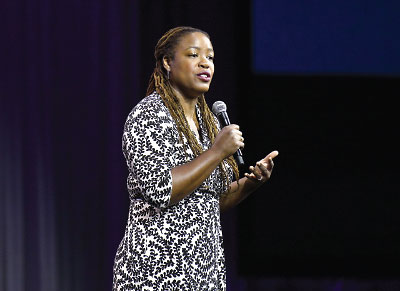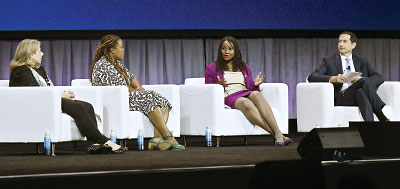McGhee Highlights Importance of Facing Racism’s Hidden Cost
Abstract
Author Heather McGhee outlined how racism hurts everyone and described how the willingness to dismantle racist systems can help create societies of care and love.
Early in her keynote address at APA’s 2023 Annual Meeting, author Heather McGhee asked a question that immediately elicited applause from her audience: “Why can’t we have nice things? And by nice things, I don’t mean flying cars. I mean universal, accessible health care, including mental health care.”

“Through cross-racial understanding and a willingness to face the hidden costs of racism—not just to people of color but to all of us, and to our systems and public structures—we can help to create societies of care and love, and the benefits will be for all of us,” Heather McGhee said.
McGhee is the author of The Sum of Us: What Racism Costs Everyone and How We Can Prosper Together. While introducing her, APA President Rebecca Brendel, M.D., J.D., said McGhee “designs and promotes solutions to inequality in America.”
During her address, McGhee described her search to understand why the United States is gripped by widespread inequality, in which 1% of the population owns more wealth than the entire middle class. She traveled throughout the country seeking the answer to this question. One of the core insights she discovered is what she referred to as the zero-sum fallacy: The idea that the success of one group of people comes at the expense of another. Americans tend to think of their economy as a sports game, she said, in which you want all your players on the field scoring points for your team and none of them sidelined due to debt, discrimination, or disadvantage. “But the zero-sum lie tells us that we’re not all on the same team,” she said.
“Research shows that White Americans are more likely to view the world through a zero-sum prism than are Americans of color,” McGhee said. Black Americans don’t think their progress has to come at the expense of White people’s, but the reverse isn’t true, she said.
“Who is telling my White brothers and sisters this story about how we relate to one another?” she continued. “Who is telling them that there’s a hierarchy of human value and they need to jealously guard their rung on that ladder lest they fall?”
She delved into history for the answer to that question, pointing to the need in early America to justify an economic model that was based on stolen land, people, and labor. “The zero-sum story was actually created by the colonial plantation elite in order to convince the masses of Europeans, who were themselves in various levels of unfreedom and indenture, that they had more in common with the colonial plantation class than they did with those who labored alongside them,” she said. The elite asked them to side with their color instead of their class.
The history of public swimming pools in America is an example of the zero-sum model, McGhee said. When courts began outlawing segregation, many towns and cities across the country drained their public swimming pool rather than permit integration. “When a people have been taught, have been told a story, that there is something so wrong with another group of people that they should destroy a public good rather than share it, that means that racism can have a cost for everyone.”
Zero sum has cost America too much, McGhee said. But she also pointed out positive stories of people of varying races and backgrounds coming together to improve their communities. “Through cross-racial understanding and a willingness to face the hidden costs of racism—not just to people of color but to all of us, and to our systems and public structures—we can help to create societies of care and love, and the benefits will be for all of us.”

After her lecture, Heather McGhee participated in a panel discussion with (from left) APA President Rebecca Brendel, M.D., J.D., American Bar Association President Deborah Enix-Ross, J.D., and AMA President Jack Resneck, M.D.
After her talk, McGhee was joined on a panel by Brendel, American Bar Association President Deborah Enix-Ross, J.D., and AMA President Jack Resneck, M.D. Brendel asked her fellow panelists their thoughts on significant actions that their associations could take to change hearts and minds, encouraging policies and investments that address health and the criminal and legal system and that do not marginalize huge segments of society.
Enix-Ross drew on history in her answer. “Slavery was abolished not because it was morally wrong—that wasn’t the argument. The argument was an economic one,” she said. “How clever were those lawyers to be able to take an interstate commerce clause argument and use it in a way that could advance society? That’s what we’ve got to get back to.”
Resneck pointed out that almost all physicians understand how their patients are impacted by inequality, such as housing inequity, pollution, and food insecurity. “We have a responsibility to speak up because what we care about is the nation’s health,” he said. “We have a voice and we have to use it, and that’s true if we’re talking about exposure to violence, police brutality, mental health parity, criminalization of substance use disorders—there are so many fronts on which we are the ones who cannot turn a blind eye.”
In her opening remarks, Brendel highlighted recent actions APA has taken to address diversity, equity, and inclusion. “Our work has begun, and we will keep working until we reach our goal,” she said.
She told the audience that she hoped McGhee’s speech would “empower you to lend your voice to the conversation and work to effect positive change where you live and where you work.” ■



